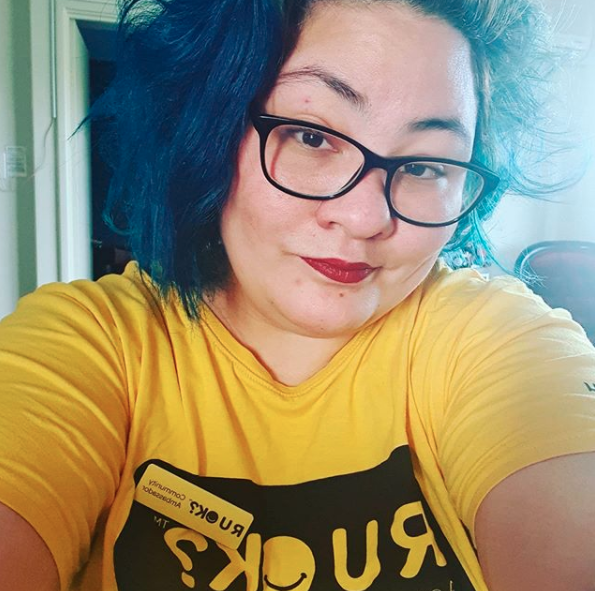R U OK? 2020: Experts reveal common error when reaching out
We all know that it’s important to reach out if someone we love, or even just someone we know is struggling with their mental health.
We’ve seen the T-shirts, heard the slogans, probably even done corporate training at one stage, but when it comes down to brass tacks, many of us find ourselves floundering, tripping on our words, lifting a hand to pat a shoulder only to leave it awkwardly hovering in mid-air, and hastily returned to our side.

The truth is, we don’t really know what to say beyond ‘are you ok’, and it turns out that is because we all tend to make one critical mistake, which is to try to say anything significant at all when very often it’s a pair of ears, rather than a mouth that is needed for support.
R U OK? ambassador Ming Johanson found herself battling serious depression when she tragically lost her partner to a motorcycle accident in 2014.
Ming says at the time it felt like she was expected to grieve on a timeline, and that very quickly people began to steer her towards ‘moving on’.
“As time passed on and everybody went back to their lives, there was a lot of times where people were uncomfortable checking in with me, and not knowing how to ask and not really sure whether or not it was causing me more grief to talk about it or whether or not it was even safe to even have that conversation,” she tells Yahoo Lifestyle.

One person even advised her that there were ‘plenty of fish in the sea’ and that she ‘just had to get back out there’ just two weeks after the funeral.
Now, this is a pretty obvious example of what you’re not supposed to say to someone grieving (or anyone at all, ever to be honest) but Ming says it wasn’t just the type of advice, but any advice at all that often proved more damaging than helpful.
Say less, listen more
She advises, as do professionals, that trying to sympathise, or solve someone's dilemma is not the point of ‘R U OK?’.
Rather, it’s better to think of ourselves as giving them a canvas on which to paint some of their feelings and air some of the thoughts they may be hiding in the darker corners of their mind.
“I think having someone just listen, and not try to fix it, was probably the most powerful thing anybody could ever do,” she says.
“Having someone give you space to talk that through helps to make you feel a little less alone.”
R U OK? Think Tank Chair, Kamal Sarmar tells Yahoo Lifestyle that the best way to approach what for many is a hard conversation with a friend is to simply actively listen when they are ready to talk.
“The wrong way to follow up is saying ‘oh I totally understand how you feel’,” he tells Yahoo Lifestyle. “We really don’t understand how another person feels.”
Sabina Read, who is employment site SEEK’s Resident Psychologist agrees with this.
“Your role is to show support not offer a solution or judgement,” she tells Yahoo Lifestyle.
Most common mistakes when asking ‘are you ok?’
And this is where we fall into the most common mistake, to try and fix, advise or offer a parallel in our own lives to reflect on a situation that really, we are not experts in.
We’ve all done this, or felt the grinding frustration of having someone derail a conversation with their own experience, just as you were beginning to pull your long-hidden feeling out of that hard to reach cavity inside.
“Our job is not just to give them advice,” Kamal points out. “Our job is to stay connected with them. The more we can stay connected to them and let them open up and untangle the knots that are inside them, the more likely you are to get a response from them that is more open and honest.”
Ming agrees, and says the worst thing to do is explain somebody’s feelings away, or point out why they should be sad, anxious, depressed, or all of the above.
“I had friends who would check on me, but then immediately say ‘just get over it. It’s been long enough now. You don’t need to feel this way anymore.’ And it was because my grief would make them feel uncomfortable,’” Ming revealed, adding these words can be more damaging than ignoring the issue altogether.
“The impact of that was it just made me feel more alone, it made me feel that it wasn’t safe to talk about what I was going through, that if I spoke about it that I would immediately feel ashamed for feeling whatever I was feeling at that time.”
Sabina adds that in just listening, we often give people to room to come to their own solutions or conclusions.
”When we listen, we’re not looking for a solution and we’re not looking to judge,” she points out. “Just sitting in silence is often okay and lets another person tap into their own resources.”
What if they are ‘fine’, but they’re not really fine?

Kamal advises that if someone is reluctant to open up, the trick is not to verbally drag it out of them then and there, but rather be a constant in their life so that when they are ready to open up, they can turn and see you there, waiting.
“Sometimes when we are in a bit of a dark space it is hard for us to seek that support,” he says. “The main thing is to keep on asking, to keep on checking in. If someone says they are fine at first just regularly check-in.”
Sabina agrees that gentle persistence is the best approach.
“Many people will need repeated check ins before they are willing to open up in an honest and vulnerable way,” she says. “So be prepared to go back a second, third or fourth time to help foster trust and let the person know your concern is genuine, and you have time to listen and be present.”
Ming says in her experience, if ‘are you ok’ seems too big a question, even just gently reminding someone that they are on your mind can be a big help.
She says just calling someone and saying, ‘you were on my mind’, or texting that you are thinking of them can make someone comfortable enough to eventually open up, or help them in a very dark place.
“I did have people that would say, ‘you were on my mind and I thought I would just drop in’” she recalls.
“It just reminded me that I did matter to somebody.”
How do you know when it’s time to reach out?
Eventually, Ming did need more than a text message, with a friend forced to drop everything to bring her to the GP to set up a mental health plan after a panic attack left her paralysed at a public library.
If you’re concerned a friend is reaching that stage, Kamal says there are certain signs to look out for, and that when it comes down to someone’s safety it’s always best to err on the side of ‘care’ rather than making sure not to offend them.
“Look for things that are outside the ordinary,” he advises.
This can include if somebody is not showing up to work, or seems not themselves.
He says someone being constantly tired can be a sign of something more than sleep deprivation, and at the end of the day to trust your gut if something feels wrong.
“Trust your gut instinct and pick up the phone and call them, or go and check in on them and ask them to go for a coffee,” he advises.
Ming, who now advocates for mental health awareness, has found love again with a new partner, and speaks openly and candidly about her ongoing treatment of the PTSD she was eventually diagnosed with, shared the three things she always makes sure to say to people, that she wishes had been said to her earlier.
“You’re allowed to feel this. Whatever you’re feeling right now is completely acceptable. I’m not uncomfortable with you having those feelings,” she says.
Above all, both agree that if you don’t feel ok, and you don’t feel supported the best thing to do is to seek medical help, be that a GP or a simple call to Lifeline.
Mental health support for yourself or a loved one can be found by calling Lifeline on 13 11 14, Mensline on 1300 789 978, or the Kids Helpline on 1800 551 800.
Online support is available via Beyond Blue.

 Yahoo Lifestyle
Yahoo Lifestyle 




